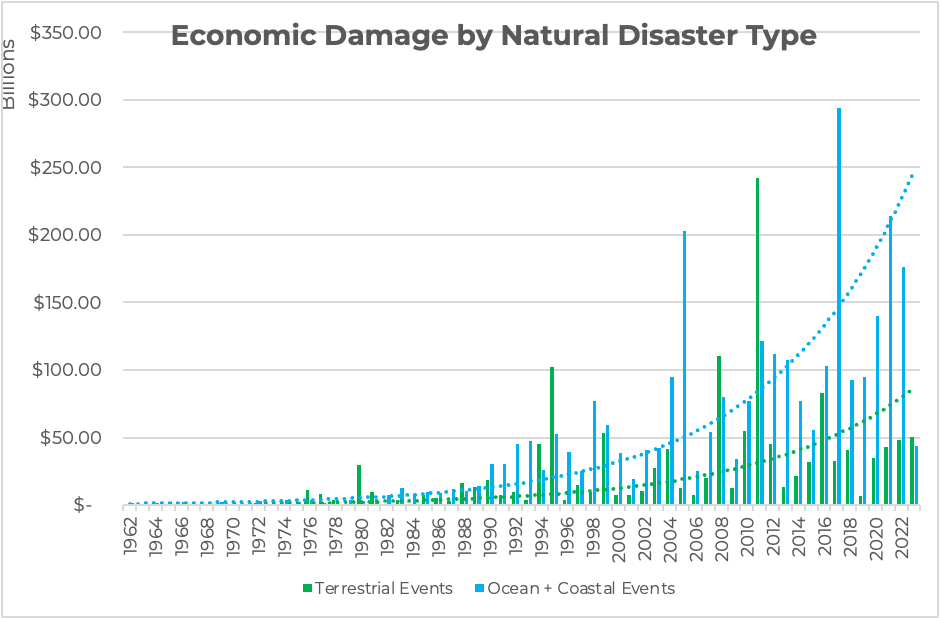In the last 60 years, natural disasters, driven by climate change, are punishing coastlines at a far greater rate than inland disasters (see graph). Furthermore, the extremes of these events will worsen and may likely increase in frequency. Not to mention the fact that 40% of the world’s population lives in, commutes through, works around, and is otherwise part of this impact zone.

What was once a rounding error in insurance, is turning into a multi-hundred-billion-dollar-a-year-loss certainty for coastal businesses and dwellers. In fact, insurance companies are either walking away from this market because of the uncertainty of the actuarial models, or are charging so much that customers are forgoing coverage which will (in the US) stress federal recovery funds. FEMA Administrator Deanne Criswell spoke of flood premiums in 2023: “as insurance costs go up, we are on the edge of a major disruption of property insurance availability. We also see disruption in flood insurance, which is primarily provided by the federal government as rates increase to reflect the growing risk, and some people simply can't afford those new premiums.”
And there are a pittance of entrepreneurs working on technologies to solve for adaptation, longevity, data, response and the other angles to these problems.
We tend to think of the results of climate change in the abstract: my favorite beach will be gone; what earth will my kids grow up in; the world will end. Really cheery stuff. That's mostly because people stink at discounting the future. They don’t like to or aren’t able to harden themselves for the type of change that’s coming and make adjustments to thrive in our changing environment.
One of my hopes in our work at Propeller is that entrepreneurs will build for the future we need. There are real pain points upon us right now as a result of climate change. Most pressing for the majority are extreme weather events and wildfires. Some folks are experiencing desertification. These problems of today are opportunities tomorrow.
What is unique and interesting about these problem sets is that they are newly extreme and often acute. Flooding is made worse by more water in the sea; storms are more severe and move faster; and all our infrastructure was built to last decades ago, not today. And they will become more acute, sometimes exponentially so, as a result of our ever more poisoned atmosphere. And no place will experience more of that pain than those adjacent to the ocean, on coasts: rising sea levels, brutalizing storms, suddenly saline aquifers, degraded ecosystems and endangered aquatic food security (to name a few) are all suffering from climate-driven disasters.
We’re eager to meet the audacious climate entrepreneurs building once-in-a-generation solutions for our changing coastlines. We want to collaborate with other companies, funders, policy-makers and agents of change taking on this challenge. We want to hear from you-please reach out.
*Pulled this data off OurWorldinData-EDAT
In another world, would love to (1) correct it for inflation and (2) adjust it by the value of assets exposed.
**Note-I wrote this and then was scooped by a great article from Manuela Andreoni at NYT (with contributions from Propeller friend Ayana Elizabeth Johnson). I’d be interested in their reaction-as it seems we may not be in sync on the need for innovation here.